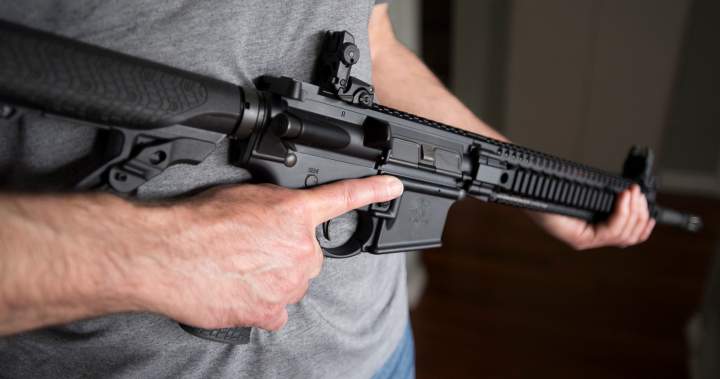The federal government’s gun buyback pilot project to compensate legal owners who turn in prohibited firearms is facing opposition in Cape Breton, N.S., where it’s being rolled out.
“They got us backed into a corner,” says John Campbell, owner of The Bullet Box, a gun store and indoor range in Sydney, Cape Breton.
Campbell started his business six years ago out of a passion for sport shooting.
Now, he says his six-year-old business faces closure.
“When you have your inventory essentially being frozen and saying you can’t sell it but yet we still had to pay for, it’s devastating. It’s a very hard thing to come back from,” he says.
He says firearms that were his top sellers, particularly for competitive target shooters, are now on the federal list of 2,500 guns that have been classified as prohibited weapons.
Campbell argues a lack of understanding about the weapons is part of the problem.
But the government says the firearms on the banned list shouldn’t be in anyone’s hands.
“This is about public safety and security of our communities and putting the protections in place to prevent further victimization and tragedy from gun violence,” said Cape Breton Regional Police Chief Robert Walsh at an Ottawa news conference on Sept. 23.
The force is one of a handful in the country that’s agreed to assist the federal government in a pilot project to test its Assault-Style Firearms Compensation Program (ASFCP).

Get breaking National news
For news impacting Canada and around the world, sign up for breaking news alerts delivered directly to you when they happen.
The program offers gun owners money to hand in or disable weapons on the list, with compensation listed at anywhere from $150 to more than $9,900, depending on make and model.
Participants can register and arrange an appointment to drop off their firearms to the Cape Breton Regional Police Service, or have them disabled by a gunsmith who would provide proof of the service.
Federal officials say hunters and sport shooters can instead use one of the 19,000 legal guns still available in Canada.
According to the Cape Breton Regional Police Service, Public Safety Canada has already received some registrations and submissions into the program have been received and are being processed. The goal of the pilot is to take in 210 guns in order to work out any kinks in the process.
But even before the program officially launched its online portal Oct. 1, gun owners in Cape Breton were organizing against it. About 100 people rallied in front of the Cape Breton police headquarters Thursday, and a town hall that evening brought out the same amount.
Rally participants and gun owner Mel Howley doesn’t own any of the banned firearms, but worries his shotguns could be next.
“Instead of working with us, we always seem to be at loggerheads with the federal government,” he says.
Avid hunter Darlene LeBlanc doesn’t believe the ban will help prevent gun violence, calling it “government overreach.”
“To allow crime to continue on our streets with illegally obtained firearms, why are they coming after the legal ones?” she asks.
“I have no interest in participating in something like that,” says gun owner Simon Evis. “The policy they’ve chosen to pursue basically does nothing to reduce the gun crime and enhance public safety.
“I will think about it before I give them over,” says sport shooter Simon Lee. “Because the thing is total nonsense.”
Local organizers brought in a representative of the Canadian Coalition for Firearm Rights, and Conservative MP Blaine Calkins for the events. Both urged attendees not to hand in any firearms.
“We’re here in Cape Breton to tell the good people of Cape Breton that they don’t have to be the target of their MP and their police chief, and they do not need to participate in this pilot project,” says Tracey Wilson, vice president of public relations at the firearms group.
Critics at both events argued the projected $756 million cost of the program would be better spent on stopping illegal firearms from entering the country.
“Why would we waste three quarters of a billion dollars on this program?” says Calkin, who’s also the party’s critic for hunting, angling and conservation.
Perception of the program also suffered the day before it was announced when audio of a conversation involving Public Safety Minister Gary Anandasangaree was leaked to the public. In the audio, Anandasangaree suggested he would have handled the whole matter differently, if given the chance.
Cape Breton University political scientist Tom Urbaniak says that put a national spotlight on the pilot project.
“It couldn’t have been a worse situation in terms of public relations for the minister,” he says.
“Critics of the policy have seen the pilot as a bit of an opportunity not only to gain local attention, but also national attention.”
Urbaniak doesn’t think the government will back down.
“But where there may be some discussion even within the Liberal caucus are around some of the details in terms of compensation,” he explains, “or if the conclusion is that the pilot really didn’t go well, whether there’s some kind of grandfathering mechanism.”
Amnesty under the program ends in October 2026, before keeping the firearms becomes a criminal offence.
Read the full article here

